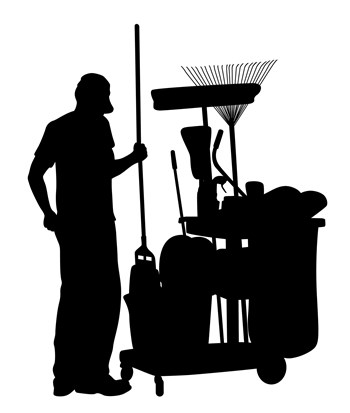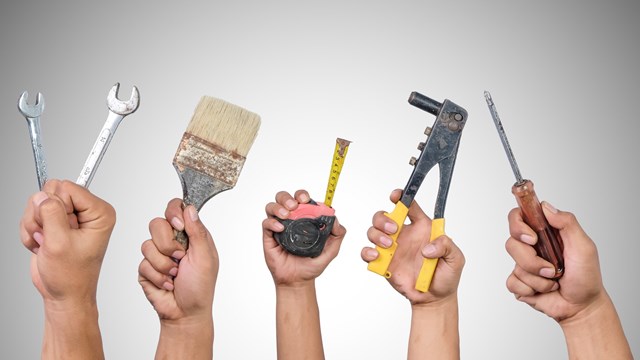
As long as there have been residential buildings, there has been maintenance personnel—be that a superintendent, a chief engineer, or a collection of reliable individuals. They're charged with the all-important task of ensuring that operations run smoothly. Whether it’s an underperforming HVAC system, a maintenance emergency, or simply a light bulb past its expiration date, the responsibilities can run the gamut on a daily basis. And over the years, the job description has changed along with expectations from property managers, board members, and residents.
“Over the last few decades the role of a superintendent has changed tremendously,” says Peter Grech, a resident manager and the director of educational services at the Superintendents Technical Association of New York City. “We need to keep abreast of changing technologies such as email and cell phones, and also with building system controls such as boilers and other automated systems.”
"Technology has immensely improved the communication between supers and managers," echoes Elaine Warga-Murray, CEO of Regency Management Group in Howell. "The immediacy spurred by text is fantastic. Instead of laboring to explain a situation over the phone, a super can just send us a picture. Rather than telling us that, say, a stairwell looks 'fine,' they can just let us see for ourselves."
Dan Wurtzel, president of FirstService Residential New York, which serves New Jersey as well, says he's seen the role of a super go through myriad changes—even down to personal appearance. “If you go back to 40 or 50 years ago, a superintendent was considered more of a blue-collar type of employee, with a tool belt who was able to fix things; he didn’t have good customer service skills, but knew how to deal with the heart of the house issues,” Wurtzel continues. “The role has evolved. Today, a superintendent, some of whom wear suits and ties, has to have knowledge of building systems. They also have to be excellent managers and communicators who oversee staff.”
Grech adds that in many cases, including his own, the title of superintendent has evolved to ‘resident manager.’ “Some of the changes which I mentioned have been around for about ten years, but this industry is forever evolving,” says Grech. “The older you are the harder the transition. It’s not impossible, but some people are used to doing things the old fashioned way.”
Most superintendents have between five and 15 years of experience, and are well-versed in new building operating systems, communication advancements in social media, and the like. But, Grech says some of the more seasoned industry vets are a little slower to adapt to a new business model. “Today, supers are more hands-off and have more of a supervisory role; they tend to be more people-orientated as well,” says Grech. “Our challenges are shifting to become more focused on the technology side and less on the hands-on side of the business. This is just how things are going, due in part to the green, efficiency movement. But, there are still some buildings left where you will see a more hands-on approach.”
Communication
As the role of the super/resident manager has changed drastically over the years, the role of support staff has also adjusted. Traditionally a male-dominated industry, Michael Berenson, president of AKAM Associates in New York City, says that he is seeing more women in these roles. Additionally, supers overseeing larger buildings—some with 1,000 units—have a dedicated support staff on-site. “Some of our properties have assistant superintendents and many of them have handymen, who are the next in command,” says Berenson.
In many cases, superintendents or resident managers will live on-site. As a result, they often not only know the building like the back of their hands, but also know the residents. Berenson said that most of the supers employed at AKAM’s 160 managed properties work from 8:00 a.m. to 5:00 or 6:00 p.m. However, sometimes there is a gray area as to when a super is off the clock. “After the work day, they are available after hours if there is an emergency or something needs immediate attention,” says Berenson.
Warga-Murray, who has dealt with properties from dense high-rises to smaller, more suburban associations, observes that there are contractors that now provide superintendents for those communities that don't require eyes and ears on the ground all day. "Maintenance contractors or construction contractors are hiring porters and they are hiring superintendents and providing them to associations, much like a staffing agency would," she says. "Many associations only require a part-time superintendent due to their budget or their size."
In certain scenarios, like a failing boiler on a cold winter night, the super will jump into action to try to solve the issue regardless of the time of day. There are other situations, however, when residents, some of whom have paid millions for their condo and pay high monthly fees, can expect too much from these professionals and ask for assistance that is beyond the job description.
"Boards have a tendency to develop personal relationships with supers, and they very often fail to follow management recommendations," says Warga-Murray. "For example, they may contract the super to handle a paint job, when management is more than capable of securing a better vendor. And if a job needs to be redone, that's just going to cost more money and time."
Wurtzel explains that the best way to mediate potentially volatile situations is to have a chain of command in place that is understood by the board, residents, manager and superintendent. “Having parameters and guidelines in place is helpful to ensure that residents know when to go to the superintendent or management, and how to file a complaint,” says Wurtzel. “We don’t want any building employee to be doing things outside of his or her skill set or training,” he continues. “If there is a noise complaint, for example, we ask that the super does not get involved. The super is trained to tell the resident to contact management.”
Warga-Murray also suggests that every board have an engineer evaluate its property and adopt specifications for maintenance, isolating the types of work that should or should not be done by a super. "Management saying something should be so, is often not enough. But having someone with valid certification second that opinion often helps the board understand that there's a serious liability issue should they, for example, send someone onto the roof."
To ensure that all of AKAM’s resident managers and employees are literally on the same page, each individual employee is provided a work email, which serves as a medium for all communications. “Say there is a heavy weather system coming, whether it is two feet of snow or Hurricane Sandy, we guide all of our men and women through email about protocols, and it’s interactive. They will respond to us,” says Berenson.
Education
While boards and managers can assist superintendents with certain in-house issues, the role of the super or resident manager can be improved upon with training and education. AKAM, for example, has a Superintendents Club, which meets every 10 weeks. In recent years, emergency management officials have presented seminars on crisis scenarios, such as blackouts or terrorist attacks, and the fire department has been brought in to conduct seminars on related emergencies.
“We had engineers come to teach our superintendents on what to look for when they walk our properties—from the roof to the basement,” says Berenson. “We had had ethics seminars. We have attorneys come in to speak as well. It is a great learning experience and [supers] get to bounce ideas off each other. A lot of brainstorming goes on.”
The Mind of a Super
In today’s market, however, a superintendent needs to have a fundamental understanding of building operations. This is not to say that he or she needs to be well-versed in all aspects of the building’s operations—especially advanced automated operations—but more so be able identify issues and contact professionals before the problem escalates.
“They don’t have to be an elevator mechanic, but they should know the basics on how that works, or how the other systems within a particular building operate. You need that base knowledge,” says Wurtzel. “Licensing requirements are set by the city and the state, depending on the type of equipment you have in your building. For example, if an air conditioning unit exceeds a certain tonnage, the fire department will require a license to operate it. To operate a standpipe or sprinkler system, a certificate of fitness is required.”
In the final analysis, a building’s superintendent is essentially a jack-of-all-trades. Grech says that the most important trait to master is that of the communicator, which is often difficult when dealing with disparate personalities.
“Often there is no communication between the board and the superintendent,” says Grech. “At a recent meeting, I restated to the shareholders that ‘co-op’ means to cooperate. There has to be more sympathy for one another. And while there are books on this topic, I really believe and have suggested that people in this profession take a course on psychology. It has to be the right person to teach it though, not just someone blabbing out of a book.” Perhaps supers could teach a course on psychology in their own right.
W.B. King is a freelance writer and a frequent contributor to The Cooperator. Staff Writer Mike Odenthal contributed to this article.






Leave a Comment